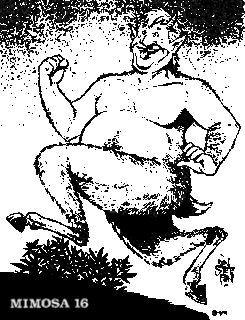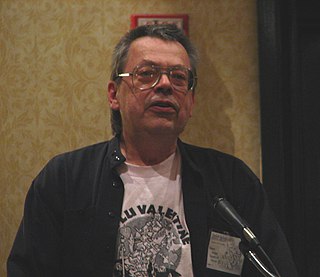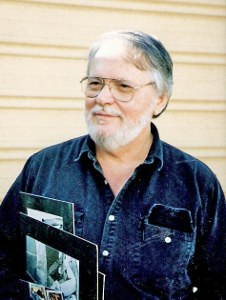
Science fiction fandom or SF fandom is a community or fandom of people interested in science fiction in contact with one another based upon that interest. SF fandom has a life of its own, but not much in the way of formal organization.

A science-fiction fanzine is an amateur or semi-professional magazine published by members of science-fiction fandom, from the 1930s to the present day. They were one of the earliest forms of fanzine, within one of which the term "fanzine" was coined, and at one time constituted the primary type of science-fictional fannish activity ("fanac").

David Rowland Langford is a British author, editor, and critic, largely active within the science fiction field. He publishes the science fiction fanzine and newsletter Ansible, and holds the all-time record for most Hugo Awards, with a total of 29 wins.

The Hugo Award for Best Fanzine is given each year for non professionally edited magazines, or "fanzines", related to science fiction or fantasy which has published four or more issues with at least one issue appearing in the previous calendar year. Awards were also once given out for professional magazines in the professional magazine category, and since 1984 have been awarded for semi-professional magazines in the semiprozine category; several magazines that were nominated for or won the fanzine category have gone on to be nominated for or win the semiprozine category since it was established. The Hugo Awards have been described as "a fine showcase for speculative fiction" and "the best known literary award for science fiction writing".

The Locus Awards are an annual set of literary awards voted on by readers of the science fiction and fantasy magazine Locus, a monthly magazine based in Oakland, California. The awards are presented at an annual banquet. In addition to the plaques awarded to the winners, publishers of winning works are honored with certificates, which is unique in the field.
Mike Glyer is both the editor and publisher of the long-running science fiction fan newszine File 770. He has won the Hugo Award 12 times in two categories: File 770 won the Best Fanzine Hugo in 1984, 1985, 1989, 2000, 2001, 2008, 2016 and 2018. Glyer won the Best Fan Writer Hugo in 1984, 1986, 1988, and 2016. The 1982 World Science Fiction Convention (Worldcon) committee presented Glyer a special award in 1982 for "Keeping the Fan in Fanzine Publishing."
File 770 is a long-running science fiction fanzine, newszine, and blog site published/administered by Mike Glyer. It has been published every year since 1978, and has won a record eight Hugo Awards for Best Fanzine, with the first win in 1984 and the most recent in 2018.
Walter Alexander Willis (1919–1999) was a well-known Irish science fiction fan, resident in Belfast.

Theodore Edwin White is a Hugo Award-winning American science fiction writer, editor and fan, as well as a music critic. He writes and edits as Ted White. In addition to books and stories written under his own name, he has also co-authored novels with Dave van Arnam as Ron Archer, and with Terry Carr as Norman Edwards.

Mimosa was a science fiction fanzine edited by Richard Lynch and Nicki Lynch. It won six Hugo Awards for Best Fanzine and was nominated a total of 14 times (1991-2004). The headquarters was in Gaithersburg, Maryland.

Arthur Wilson "Bob" Tucker was an American theater technician who became well known as a writer of mystery, action adventure, and science fiction under the name Wilson Tucker.

Patrick James Nielsen Hayden, is an American science fiction editor, fan, fanzine publisher, essayist, reviewer, anthologist, teacher and blogger. He is a World Fantasy Award and Hugo Award winner, and is an editor and the Manager of Science Fiction at Tor Books.
Locus: The Magazine of The Science Fiction & Fantasy Field, founded in 1968, is an American magazine published monthly in Oakland, California. It is the news organ and trade journal for the English-language science fiction and fantasy fields. It also publishes comprehensive listings of all new books published in the genres. The magazine also presents the annual Locus Awards. Locus Online was launched in April 1997, as a semi-autonomous web version of Locus Magazine.

Stephen Willis Stiles was an American cartoonist and writer, coming out of the science fiction fanzine tradition. He won the 2016 Hugo Award for Best Fan Artist.

Charles William Rotsler was an American artist, cartoonist, pornographer and science fiction author. Rotsler was a four-time Hugo Award winner and one-time Nebula Award nominee.
Nova Express was a Hugo-nominated science fiction fanzine edited by Lawrence Person. Nova Express is named after William S. Burroughs' Nova Express and the fictional magazine Nova Express in Alan Moore's Watchmen. It remained in publication between 1987 and 2002.

Bruce Gillespie is a prominent Australian science fiction fan best known for his long-running sf fanzine SF Commentary. Along with Carey Handfield and Rob Gerrand, he was a founding editor of Norstrilia Press, which published Greg Egan's first novel.
Hyphen was an Irish science fiction fanzine, published from 1952-1965 by Walt Willis in collaboration with James White, Bob Shaw and various others. Over that period, they published 36 issues. In addition, a 37th issue was created by the Willises in 1987 to celebrate the 40th anniversary of Irish science fiction fandom.
Energumen was an influential science fiction fanzine edited by Mike Glicksohn and Susan Wood Glicksohn from 1970–1973, with a special final "11th Anniversary Issue!!" [sic] in 1981 after Susan's death. The fanzine was based in Ottawa. It won the Hugo Award for Best Fanzine in 1973, after having been a nominee for the Hugo Award for both the prior years.
Argentus was a science fiction fanzine edited by Steven H Silver. It won the Chronic Rift Roundtable Award for Best Fanzine in 2009 and was nominated for the Hugo Award for Best Fanzine three times (2008–2010). The magazine ended publication in 2014.










